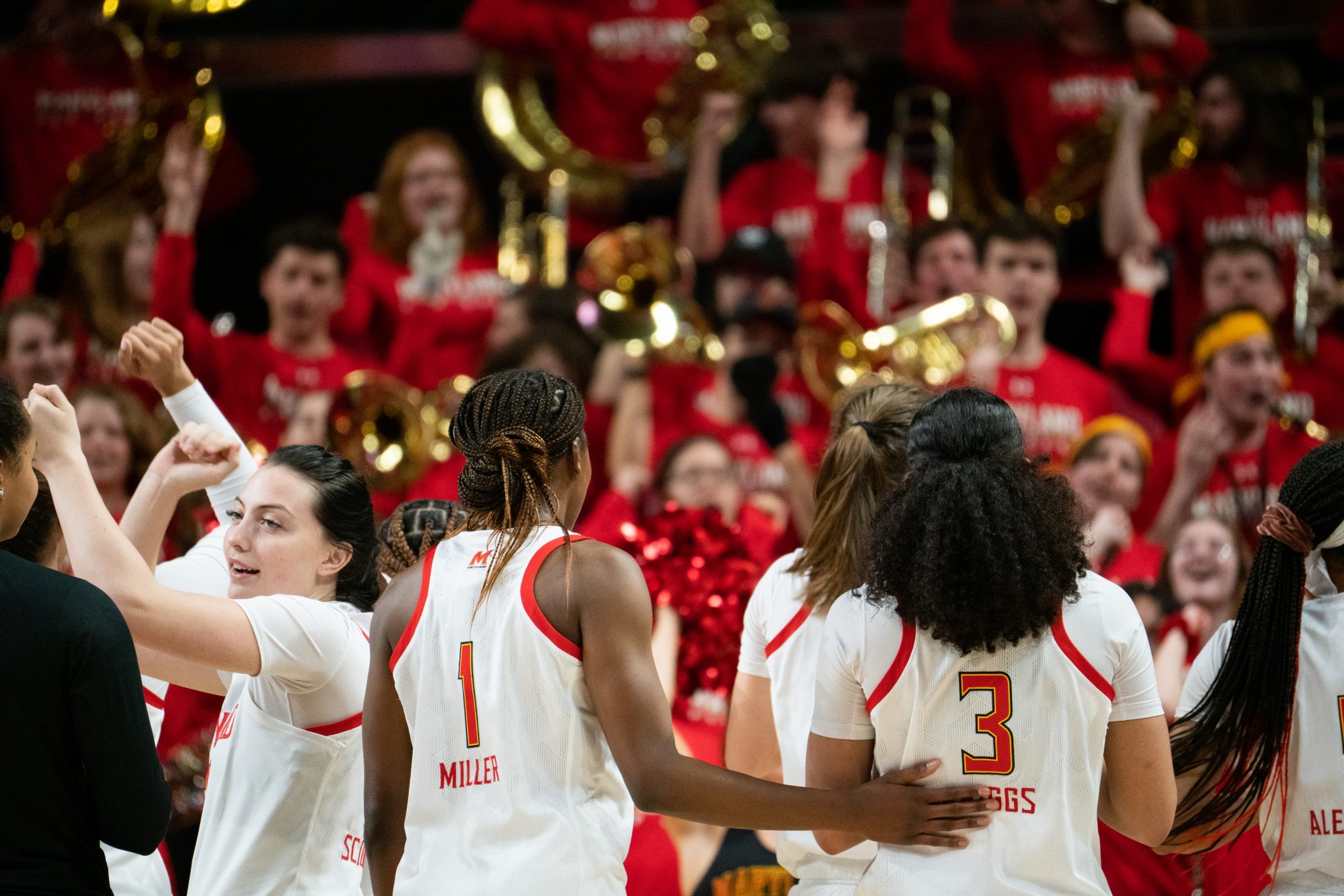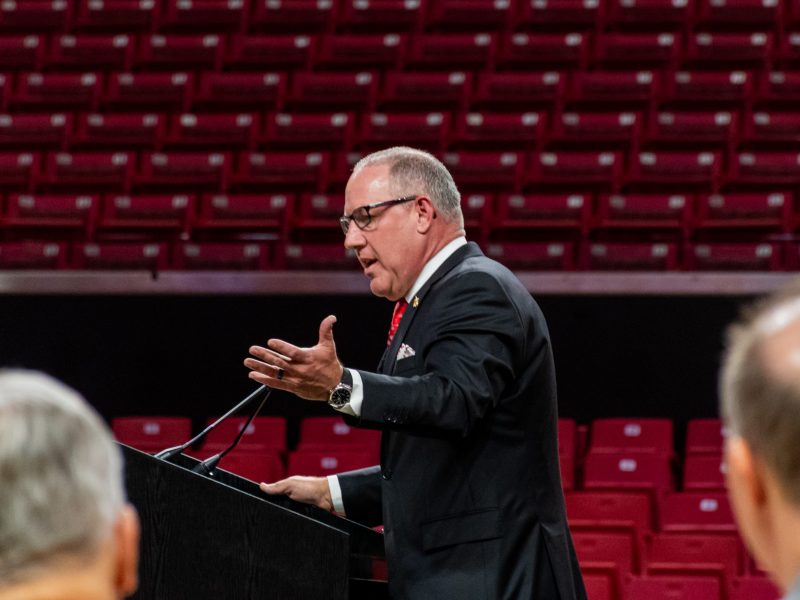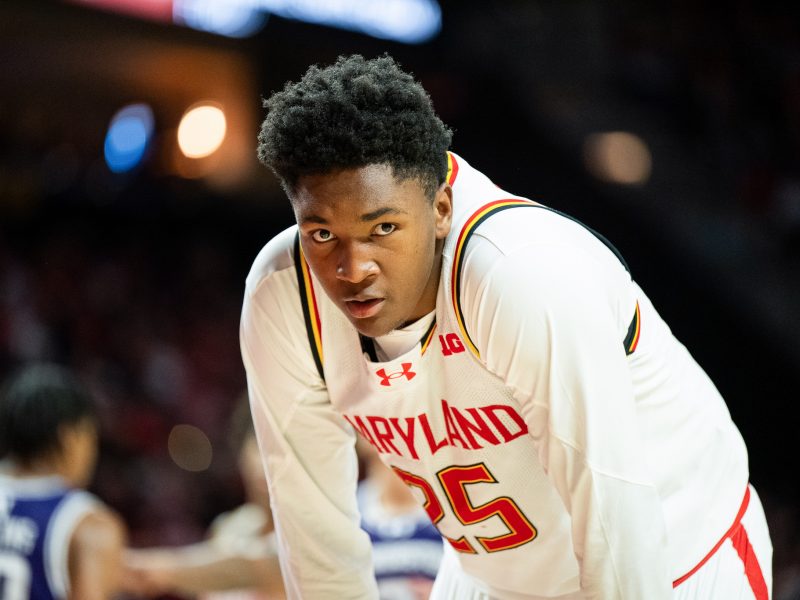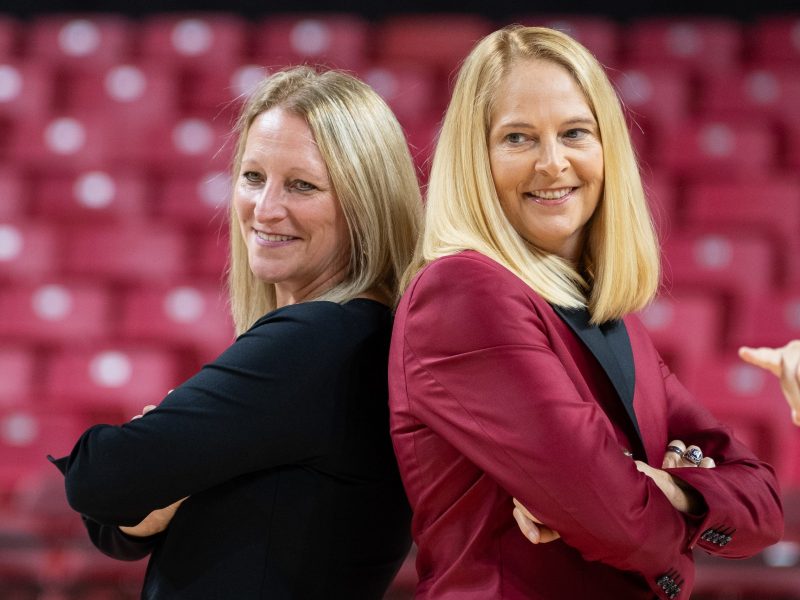When coach Brenda Frese walked into her team’s locker room after their 76-59 victory over Notre Dame, she was bombarded with sprays of water as the team celebrated its first Sweet 16 win since 2015.
Abby Meyers and Elisa Pinzan drenched Frese’s head while the triumphant cheers of their teammates drowned out all other noise. Shyanne Sellers stood on the outskirts of the room with a towel covering her head, taking it all in.
“I think that was just like the perfect example of how much we care about each other,” she said.
Less than a year earlier, Maryland women’s basketball was in an opposite position after five players entered the transfer portal and two graduated, leaving the team with only four returning players for the 2022-23 season. The previous spring was “daunting” for Frese and her staff, she said, as they knew they needed to recruit heavily in the transfer portal to build a new roster.
But they prevailed, adding four transfers and signing two more incoming freshmen to complete the 2022-2023 Terps.
“We put our head down and went to work, and felt like we were getting the right pieces,” Frese said. “But you know, there was another element with how they would blend, the chemistry.”
Despite only one returning starter and “the hardest” schedule Frese’s team ever faced, the new-look Terps improved upon their 2021-22 record thanks to improved team chemistry and their ability to bounce back from the losses. Maryland faced obstacles before the season even began. Three players were recovering from offseason surgeries while Allie Kubek tore her ACL in a preseason practice. In the first game of the season at George Mason, Emma Chardon and Diamond Miller both exited early with injuries.
[‘It’s speed dating’: How Maryland women’s basketball has operated in the transfer portal]
Miller’s injury meant the Terps would be without their strongest player for their home opener against reigning national champion South Carolina. Maryland ultimately fell 81-56 to the Gamecocks and tallied their first loss of the season.
Miller returned in the next game, but Maryland continued to experience ups and downs in its first month of games, highlighted by losses to DePaul and Nebraska.
“It was fragmented,” Frese said. “I think in October, November, December, you had everyone kind of on individual silos and islands, they were all trying to figure it out.”
But Frese found a silver lining in the team’s subpar start to the season. Without those early, difficult games, the Terps would not have been forced to trust each other and find different ways to succeed, Frese said.
While she’s unsure if she’d ever schedule a season with four ranked non-conference opponents and so many new players again, it paid off in the long term. Every loss made the team come back stronger, Frese said.
“Even after some of those tough losses we came off of, you could just tell the shift of focus and how locked in everybody was because it was just like we wanted better for ourselves,” Brinae Alexander said.
Maryland went on a six-game win streak after a loss in its Big Ten opener to Nebraska, which included its first win against UConn in program history. The Terps only lost twice the rest of the regular season.
The team’s unique bond led to a selfless culture, which was absent in the previous season, Frese said.
Players never complained about 7 a.m. practices at the Xfinity Center and “made the most of it,” blasting Lil Baby songs at the request of freshman Gigi Cooke.“We’re blasting music in the locker room at 7 a.m., I don’t know who the hell does that,” Sellers said. “But we did and we found joy in each other … it kind of just helped our bond grow and that translated to the court.”
[Maryland women’s basketball’s season ends in Elite Eight to South Carolina, 86-75]
With several new faces, the team had bonding opportunities before the season began.
After a bad storm in College Park caused the team’s apartments to lose power over the summer, the players called associate head coach Karen Blair, who invited the whole team to spend the night at her house. Blair even made them breakfast, Sellers said.
As one of the few returning players from the 2021-2022 team, Sellers noticed the differences between the two groups. This year, her teammates didn’t dwell on what outsiders said and focused on collective rather than individual performance, she said.
“This year’s team was more of, ‘we got to do this, we got to do this,’ and then, I feel like my freshman team, not everybody but, I just feel like some people were like ‘damn I had a bad game, but we won by 30.’”
Alexander, a Vanderbilt transfer, was one of the players encouraging a selfless team culture. She was voted a captain at the beginning of the season. While Alexander already had a college degree, she used her status as a newcomer to relate to freshman on the team and provide veteran leadership.
Alexander and her teammates encourage each other to use the word “rephrase” to ensure they’re communicating with each other and not letting emotions take over.
The Terps, a mix of key returners and impact additions, combined their love and respect for each other to form a selfless team culture. It resulted in Maryland’s first trip to the Elite Eight in nearly a decade.
“When you have like-minded individuals that are all pulling in the same direction together, and you can see that everyone is working hard and doesn’t want to disappoint one another, you see the results that they ultimately were able to have this year,” Frese said.



